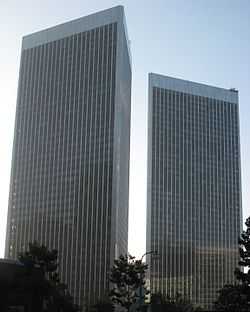Century Plaza Towers
| Century Plaza Towers | |
|---|---|
 | |
| General information | |
| Type | Commercial offices |
| Location |
2029 and 2049 Century Park East Century City, Los Angeles, California |
| Coordinates | 34°03′32″N 118°24′48″W / 34.05888°N 118.4133°WCoordinates: 34°03′32″N 118°24′48″W / 34.05888°N 118.4133°W |
| Construction started | April 1972 |
| Completed | 1975 |
| Management | CB Richard Ellis |
| Height | |
| Roof | 174.04 m (571.0 ft) |
| Technical details | |
| Floor count | 44 |
| Floor area | 2,300,000 sq ft (210,000 m2) |
| Lifts/elevators | 26 (each) |
| Design and construction | |
| Architect | Minoru Yamasaki |
| Developer | Trammell Crow Company |
| References | |
| [1][2][3][4][5] | |
Century Plaza Towers are two 44-story, 174-metre (571 ft) twin towers located at 2029 and 2049 Century Park East in Century City, Los Angeles, California.
Commissioned by Alcoa, the towers were designed by Minoru Yamasaki and completed in 1975.[6] The towers resemble Yamasaki's World Trade Center in their vertical black and gray lines and the use of aluminum exteriors. The towers have an unusual triangular footprint and are landmarks that are clearly seen around the Los Angeles Westside. Their prominence in the Century City skyline has been reduced in recent years with the addition of new skyscrapers that partially block their view. Nevertheless, the Century Plaza Towers remain the tallest buildings in Century City and the tallest skyscrapers in Southern California outside of downtown Los Angeles. The towers sit atop one of the world's largest underground parking garages with a capacity of roughly 5,000 cars.[7][8]
In television, the towers were the headquarters of the fictional private detective Remington Steele, the main character of the eponymous NBC series, which ran from 1982 to 1987. Nearly every episode included an exterior establishing shot of the towers. The towers have also served as the backdrop for several television commercials, including adverts for Samsung, Buick, Volvo, and Kia Motors. In film, the towers were prominently featured in 2011's The Green Hornet.
The buildings were used for the album cover of Yes's 1977 album Going for the One. In 1981 the buildings were used in a bumper of the silver ball for Nickelodeon.
See also
References
- ↑ Century Plaza Tower I at CTBUH Skyscraper Database
- ↑ Century Plaza Tower II at CTBUH Skyscraper Database
- ↑ Century Plaza Towers at Emporis
- ↑ Century Plaza Tower I at SkyscraperPage
- ↑ Century Plaza Tower II at SkyscraperPage
- ↑ "Century Plaza Towers: History". Century Park. 2010. Retrieved 29 November 2010.
- ↑ "Century Plaza Towers: Directions / Parking". Century Park. 2010. Retrieved 29 November 2010.
- ↑ "Stroock Parking Facilities flier". Stroock Parking Facilities. 2010. Retrieved 6 March 2011.
